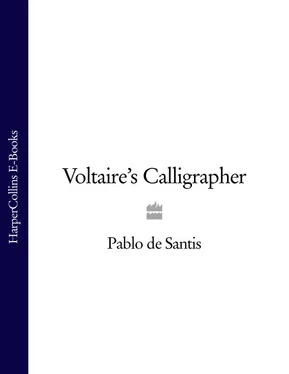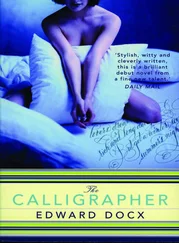I walked on to the courthouse where the Calas family was being tried. Armed guards stood at the door, and no one was allowed to enter. Conversations continued inside even though it was late; the windows above were illuminated. About a hundred people were gathered outside, circulating rumors and looking up as if the wavering light might contain a message. Everyone who came in or out of the court was accosted for news; though none replied, the crowd saw its hopes and convictions confirmed by the hush. The only person not questioned was a tall man in a cloak, who seemed to impose silence from afar and whose every step was like a period at the end of an empty phrase. I heard a whisper beside me:
‘That one there cleaned the body. He used to be an executioner.’
I followed the man in the cloak, rummaging in my bag for coins to pay for any information he could provide. He strode along briskly, and I had to run to keep pace. Windows closed and lights went out as we passed, giving the distinct impression his steps had ordered them to. I stopped next to a fountain whose waters were black: my quarry had disappeared. Before I knew it, I felt a rope around my neck and my feet were off the ground, not very high but enough that I longed to feel the earth below. The moon was reflected on the water. I struggled in vain, dancing the final jig of the hanged.
‘The last man who tried to rob me lost his right hand. I carry it in a box of salt; it brings me luck wherever I go.’
I tried to speak but couldn’t. I reached into my pocket for a coin and let it fall on the cobblestones. My attacker dismantled the gallows, and my feet touched down once more.
‘I came to pay you, not rob you,’ I said.
‘I’m not selling anything.’
‘I buy words.’
‘I don’t talk much.’
‘I heard you washed the body of Marc-Antoine Calas.’
He wanted to know what so interested me that I was willing to pay for answers. I told him I worked for the Jesuits, and that they wanted to be absolutely certain the Calas boy was a martyr. The Jesuits, I explained, were trying to speed up the canonization process for priests who had been murdered in the Orient, and didn’t want any old impromptu veneration to supersede the urgent needs of the Church. I handed him another silver coin.
The executioner spoke:
‘I attended to the body until the White Penitents took it from me. Six of them came down to the courthouse basement, showed me a piece of paper I never got to read, and carried it out in procession.’
‘Was he bruised, as if hanged by force?’
‘Not a single mark, other than a scar on his left shoulder - a very old wound.’
We sat on the edge of the fountain.
‘I wasn’t going to kill you. It’s bad luck to kill a man on a full moon: he’ll haunt your dreams.’
The executioner had big hands scarred by ropes and blades. I told him I knew about his former profession.
‘I’ve beheaded criminals in Paris, hanged poor wretches in Marseille, and pushed offenders off the top of a tower in Italy. They would land on marble below, and a painter would capture their final pose. But the real art is the ax: not many can cut off a head with a single blow. The rope, on the other hand, is the simplest yet least reliable of all the methods.’
‘Why? Did someone survive?’
‘Only one man lived to say “I was executed by Kolm.” He paid my assistant to fray the rope so it would break when he dropped. A man can’t be hanged twice for the same crime in Marseille, so he was set free. But let’s talk about happier things.’
Kolm worked for the courts in Toulouse, where he washed bodies in tubs of bleach water, sutured wounds, and sometimes determined cause of death. He was hired because of his experience as an executioner.
‘Do you miss your old profession?’
‘No. I got tired of being needed but despised. Take a look at this walking stick.’
He held up a long cane made of dark wood. On the bottom was a small but perfect replica of a hand, operated by a mechanism on the silver handle.
‘I was never allowed to touch any food when I went to the market. No one would speak to me. Then I had an artisan from Nuremberg make this walking stick. At first no one had a problem greeting the silver hand, letting it pick up apples or fish. But then it started to malfunction and now it crushes everything it touches.’
The hand opened and closed. Kolm invited me to try it. I lifted the walking stick and, as I looked up, saw a woman standing in a window. It was the passenger we had delivered to the toy manufacturer on rue des Aveugles.
I heard the sound of the window as it closed.
I had no intention of saying anything, but suddenly heard my voice, as if it were another’s:
‘A dead woman just closed a window.’
‘I know the dead and I know they never come back; I’d have been visited by now if they did.’ Kolm looked over at the house. It was the only one that still had any lights on. A bronze bell hung out front. ‘There are seventeen women who work there. They might disappear during the day, but they come back to life at night.’
His words did nothing to reassure me, and I hurried away down the deserted street. I don’t know why, but Kolm followed me, and the moon followed him.
I went to see Kolm two days later, as he had promised to ask whether there were any openings at the court for a calligrapher. Kolm lived in a rooming house reserved for the brotherhood of executioners; they owned a building in every city to avoid the usual problems of lodging. Never having executed anyone, I wasn’t allowed in, but Kolm told me the rooms were decorated with axes, hoods, and belts that had belonged to legendary executioners. These made him nostalgic. I asked why he had left such a profitable profession.
‘Five years ago I helped to suppress an uprising against M. Ressing. I had cut off about ten heads when it seemed a pair of familiar eyes was staring up at me. I reached into the bloody basket and found my father’s head. We hadn’t seen one another in a long time, and I had executed him without even noticing. I know he recognized me, and yet he didn’t say a word: he wouldn’t interrupt my work. I haven’t executed anyone since. I was only able to recover my father’s head, which I put in a glass case and took to the town where he was born. There I gave him the funeral he deserved. For his epitaph I wrote: Theodor Kolm lies here. And elsewhere as well. ‘
It was Sunday and Kolm’s day off. We walked until we saw a crowd beside the market: a theatre company was performing The Calas Murderers.
The actors had erected a stage in a derelict square, amid statues of sleeping horses. The church had never been kind to actors, refusing for centuries to bury them in hallowed ground, but this company had chosen a topic of such popular interest that the White Penitents had even agreed to pay for the production. That night I wrote an account of the play and sent it to Ferney:
The Calas family is sitting at the table. A friend arrives from far away. He begins to talk about his city. After a while, he realizes they aren’t paying attention; no one is responding to his comments. The father, Jean Calas, finally interrupts him: he says they have a decision to make.
Marc-Antoine is preparing to convert to Catholicism, the father explains. He has been shut away in his room, reading the Bible, for the past seventeen days. We’ve hidden spiders and snakes between the pages, but nothing distracts him.
At night, the mother says, we give him candles with most of the wick removed, so they won’t last long. But he keeps reading, using mirrors to capture the moonlight. Then, on nights when there is no moon, in absolute darkness, he repeats the sacred words - words that aren’t sacred to us.
Читать дальше












